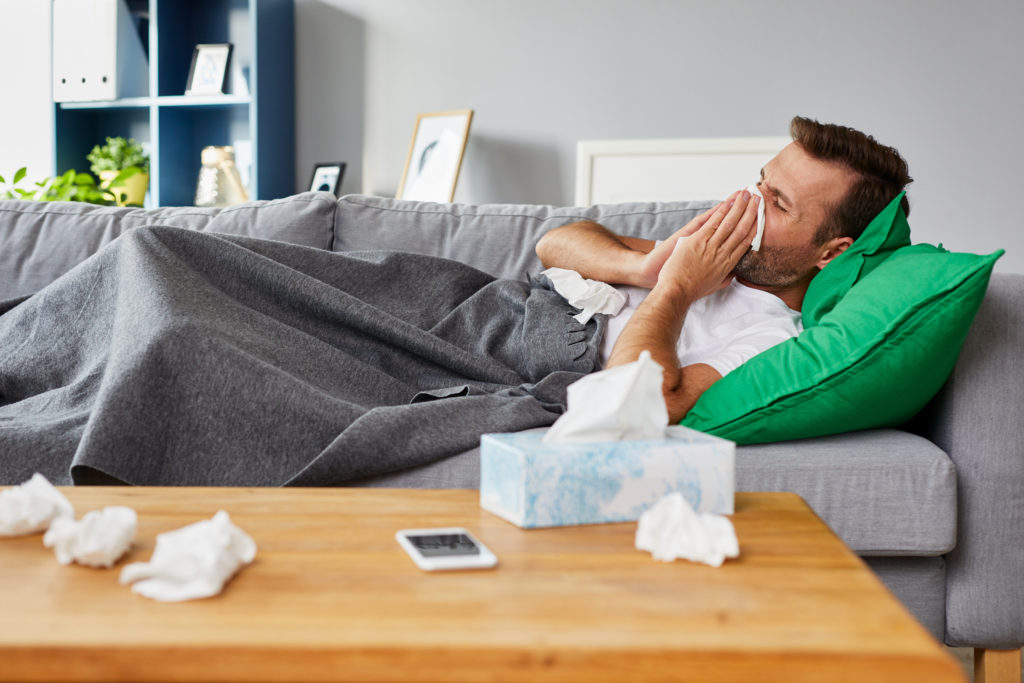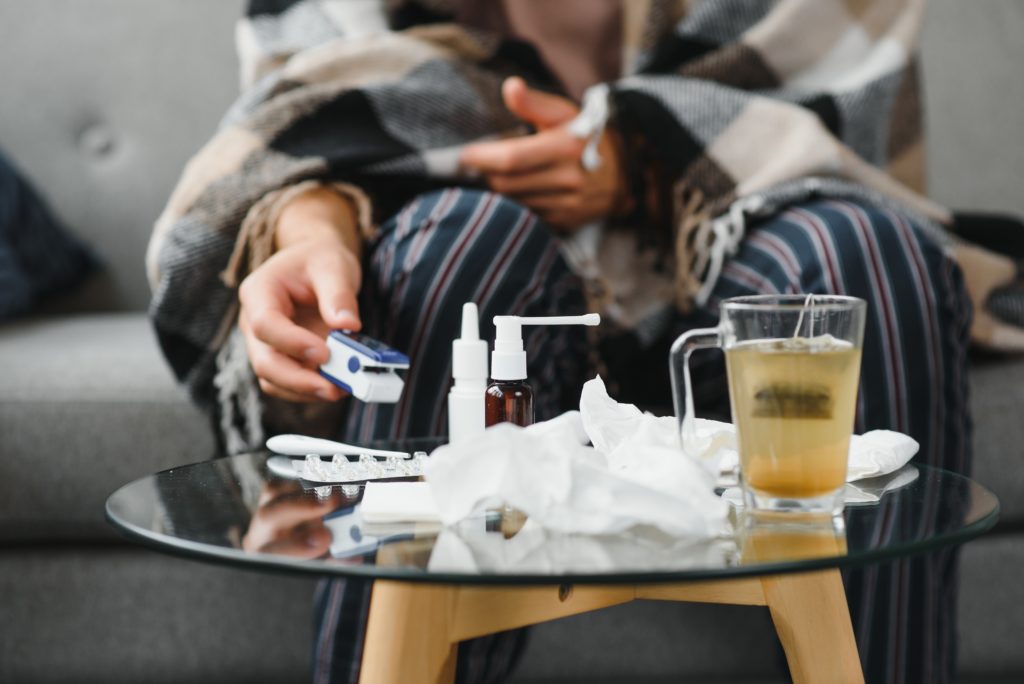December 23, 2022
What to Do When You’re Sick
Influenza, COVID-19, and the common cold are all illnesses that tend to spread throughout the holiday season and through spring. These illnesses share many of the same symptoms, which can make it challenging to know which one you have and whether it has the potential to worsen without treatment.
When you’re sick, it’s essential to take the necessary steps to care for yourself and prevent your illness from spreading to others — especially to those who may be more vulnerable. Here’s what to do when you’re sick and signs it’s time to see your doctor for treatment.
Common Signs and Symptoms of Illness
According to the CDC, adults get an average of two to three colds a year, and children experience colds more often. Symptoms of a cold are usually most severe on days two and three. Cold symptoms include:
- Stuffy or runny nose
- Sneezing
- Sore throat
- Cough
- Post-nasal drip
- Watery eyes
A cold may also cause fever, though this symptom is less common than other cold symptoms. Symptoms typically last 10 to 14 days, but can linger if your cold progresses into a sinus infection.
Flu symptoms tend to come on more suddenly than cold symptoms, and can be far more severe. The CDC reports that between October 1, 2022 and December 10, 2022, there were 15 to 33 million flu illnesses, 150,000 to 330,000 flu hospitalizations, and 9,300 to 28,000 flu deaths. Flu symptoms include:
- Fever and chills
- Runny or stuffy nose
- Sore throat
- Cough
- Headache
- Muscle and body aches
- Fatigue
- Vomiting
- Diarrhea
COVID-19 produces symptoms that range from mild to severe. Symptoms can appear between two and 14 days after exposure to this virus or any of its strains. Common symptoms of COVID-19 include:
- Fever or chills
- Stuffy or runny nose
- Cough
- Sore throat
- Headache
- Muscle and body aches
- Fatigue
- Shortness of breath or difficulty breathing
- Loss of taste or smell
- Nausea or vomiting
- Diarrhea
7 Things to Do When You’re Sick
Being sick is never fun, especially when your symptoms make sleeping, talking, eating, and doing your usual activities difficult. When you’re sick, it’s entirely possible to manage your symptoms at home, as long as they’re not severe.
1. Drink Plenty of Fluids
Water, tea, and broth are some of the best fluids to drink when feeling sick. Drinking lots of fluids can help you avoid dehydration, which can happen if you’re experiencing vomiting and diarrhea. Drinking beverages can also help relieve congestion, thin out mucus, and help your body flush out toxins contributing to your illness.
 Avoid drinking coffee and other beverages high in caffeine when you’re sick, as these drinks may cause dehydration. Alcohol can also lead to dehydration and may further increase inflammation to keep you sick for longer.
Avoid drinking coffee and other beverages high in caffeine when you’re sick, as these drinks may cause dehydration. Alcohol can also lead to dehydration and may further increase inflammation to keep you sick for longer.
2. Rest and Relax
Sleep is an optimal time for your body to heal itself. Sleep can boost your immune system function and help you recover from your illness more quickly. It can also help you relax, especially when your symptoms make you too tired or weak to perform your usual activities.
When you’re sick, try to rest, relax, and take advantage of the downtime. If you can’t sleep, take it easy and catch up on your favorite reading or television shows.
3. Stay Home
Staying home promotes rest and can prevent you from spreading your illness to others, especially if your disease is infectious. Some infections, like the flu and COVID-19, can be severe and potentially fatal for people with co-morbid conditions such as asthma or respiratory failure.
So, what to do when you’re sick at home? Stay inside as soon as you notice symptoms such as a runny nose, cough, or sore throat. If you have COVID-19, you should stay home and isolate yourself from others, even if you are vaccinated, says the CDC. It adds that you should stay home for at least five days, as you are most infectious during those first five days.
4. Eat Healthy Foods
Fruits, vegetables, fish, and whole grains are healthy foods you should eat when you’re sick. Healthy, whole foods such as these are loaded with vitamins and nutrients that can help you get over your illness more quickly. They can also strengthen your immune system and help you avoid future diseases, or severe symptoms.
Choose foods wisely according to your symptoms. If you’re vomiting, avoid eating greasy, salty, or spicy foods, as they may worsen your nausea. If you have a sore throat, stick to eating soft, warm, and soothing foods, such as soup or mashed potatoes.
5. Don’t Smoke
Smoking damages the lungs, which can worsen many symptoms of the cold, flu, and COVID-19. Smoking also lowers your immunity, which means you may get sick more frequently and your illnesses will typically last longer.
If you smoke, try to avoid smoking when you’re sick, despite how tempting it may be. If you can completely stop smoking for a few days, consider quitting for good. There are countless benefits to quitting smoking, including a longer life and reduced risk of cancer.
6. Relieve Your Symptoms
Most flu symptoms, COVID-19, and the common cold can make you incredibly miserable. Relieving your symptoms can make you feel better until you get over your illness, even if your relief is only temporary.
Relieving your symptoms can make you feel better until you get over your illness, even if your relief is only temporary.
Consider using over-the-counter (OTC) medicines or at-home remedies to relieve your symptoms. These treatments may not treat the root cause of your illness, but they can help you feel better. OTC pain relievers and cough medicines may treat headaches and cough, while steam treatments using eucalyptus or tea tree oil may relieve congestion.
Ask your doctor to recommend the best OTC treatments or home remedies based on your condition and symptoms.
7. Add Moisture to the Air
Dry, cold air can often worsen symptoms like cough, headache, sore throat, and congestion. When you’re sick, try using a humidifier or cool-mist vaporizer — both of which can add moisture back into the air and help you experience relief.
Run these devices in your bedroom and close the door to keep the moisture contained in the room while you’re resting. Make sure you follow the manufacturer’s directions, replace the water, and clean the reservoir as necessary.
When to See a Doctor
Seasonal illnesses like the flu, COVID-19, and the common cold often clear up on their own, as long as your symptoms are mild to moderate. It may be time to see a doctor if your symptoms worsen or your illness doesn’t resolve within an acceptable time frame.
See your doctor right away if you experience the following:
- Difficulty breathing
- Fever that lasts longer than four days
- Dehydration

- Symptoms that last beyond 10 days and aren’t improving
- Symptoms that keep returning, like cough or fever
- Worsening of an existing medical condition
- Persistent dizziness
- Persistent pain or pressure in the chest
- Seizures
- Inability to urinate
- Severe muscle pain
- Severe weakness
- New confusion
- Inability to stay awake, or to wake up
- Skin, lips, or nails that are pale, gray, or blue
If you have one or more of the above symptoms, your doctor will perform an examination, run any necessary diagnostic tests, and work with you to treat your condition.
Healthcare Associates of Texas offers a wide range of healthcare services and can help you experience a safe recovery from common illnesses like the flu and COVID-19. Our doctors can talk to you more about what to do when sick at home so you can start feeling better. Request an appointment with us today.
DISCLAIMER
The information featured in this site is general in nature. The site provides health information designed to complement your personal health management. It does not provide medical advice or health services and is not meant to replace professional advice or imply coverage of specific clinical services or products. The inclusion of links to other web sites does not imply any endorsement of the material on such websites.
Ready to become your healthiest self?
Get tips delivered to your e-mail inbox every month. Let’s get happier and healthier together!



